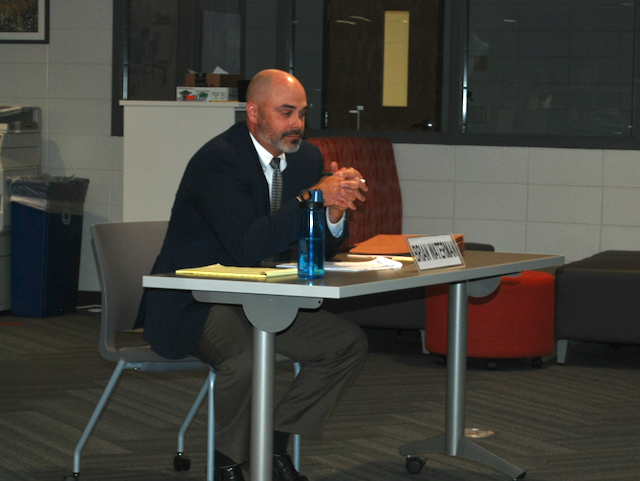WUSD Board of Education members attend workshop, review public records law
- Home
- WUSD Board of Education members attend workshop, review public records law

WUSD Board of Education members attend workshop, review public records law
Editor’s note: Members of the Whitewater Unified School District Board of Education, in advance of their regularly scheduled July monthly board meeting, attended an hour-long workshop presented by the district’s attorney, Brian Waterman, of the Waukesha-based firm Buelow Vetter Buikema Olson and Vliet, LLC (Buelow Vetter). Information shared during the workshop came in three parts: open meeting law, public record law, and school board operations. Following is the second of a three-part story about information shared during the workshop.
By Kim McDarison
Members of the Whitewater Unified School District Board of Education recently attended a workshop offering information about Wisconsin’s open meeting and public records laws. The workshop was held earlier this month at the Whitewater High School in advance of the board’s regularly scheduled July meeting.
The workshop was conducted by the district’s attorney, Brian Waterman, of the Waukesha-based firm Buelow Vetter, and offered three topics of discussion: open meeting law, public record law, and school board operations.
Board of Education President Larry Kachel, in advance of the workshop, told WhitewaterWise’s sister publication, Fort Atkinson Online, that the workshop was scheduled to help new board members better understand the laws.
As earlier reported by WhitewaterWise, the first part of the workshop, focusing on open meeting law, is here: https://whitewaterwise.com/wusd-board-of-education-members-attend-open-meeting-public-records-laws-workshop/.
Public record law
Aided by a 24-page handout, Waterman shared with board members the essentials of Wisconsin’s public records law.
According to Waterman, access to public records in the state of Wisconsin is “presumed.”
Citing state statute, he said public record law “shall be construed in every instance with a presumption of complete public access, consistent with the conduct of governmental business. The denial of public access generally is contrary to the public interest, and only in an exceptional case may access be denied.”
Within the handout, Waterman next sought to define “authority” and “custody of a record,” noting that records produced by a state or local office, elected official, agency, board, commission, committee, council, department or public body corporate or politic created by constitution, law, ordinance, rule or order, along with any public purpose corporation, court of law, assembly or senate, nonprofit corporation, receiving more than 50% of its funds from a county or municipality, and which provides services related to public health or safety to the county or municipality, are subject to public record law.
Records, by definition, according to the handout, include any material that is written, drawn, printed, spoken, visual or electromagnetically recorded or preserved, and has been created or is being kept by an authority.
Such information includes, but is not limited to, handwritten, typed or printed pages, maps, charts, photographs, films, recordings, tapes, computer printouts, and optical disks.
Additionally, the handout noted, “Although statute has not been amended to specifically include records created by computer media, such records are considered public records by courts and agencies charged with the enforcement of the public record.”
Excluded from the definition, according to the handout, are drafts, notes, preliminary computations and like materials prepared for the originator’s personal use or prepared by the originator in the name of a person for whom the originator is working.
Within the handout, a definition of “legal custodian,” also is offered, noting that “an elected official is the legal custodian of his or her records and the records of his or her office, but may designate an employee of his or her staff to act as the legal custodian.”
As stipulated in statutes, and offered in the handout, the chairperson of a committee of elected officials or the designee of the chairperson is the legal custodian of the records of the committee.
In circumstances under which the legal custodian is not identified by law, a governmental entity must designate in writing one or more positions occupied by the officer or employee of the entity as a legal custodian.
In the absence of the designation, the governmental entity’s highest ranking officer and the chief administrative officer are, as stipulated in statute, the legal custodians, the handout read.
Waterman cited conditions and potential complications that could arise as a matter of both open meetings and public records laws regarding the use by board members of electronic communications, such as personal social media accounts, networking sites, websites, blogs, and commercials sites such as Facebook, to communicate with constituents regarding board-related business.
“No individual board member may bind the board to any specific action,” the handout noted.
“Individual board members may not speak on behalf of the board unless specifically directed to do so by the board,” the handout continued.
The handout stated that members of the community may not be aware of the above provisions and may perceive comments and opinions made by board members on a blog or website as representative of the full board.
Waterman noted that even with the appropriate disclaimers placed by board members on such communications, they may send “mixed messages” to the public.
When multiple board members engage in communicating messages to the public, the handout further advised, “it may result in confusion as to which of the communications is the ‘official’ board communication.”
He advised, as a “best practice,” that the board make responsible its board president for communicating with the general public regarding board business.
Under a heading of “access to records and fees,” the handout noted that, “except as otherwise provided by law, any requester has a right to inspect any record.”
Additionally, under the same conditions, any requester has the right to make or receive a copy of a record which appears in written form.
Further, under the same conditions, “no request may be refused because the person making the request is unwilling to identify or state the purpose of his or her request.”
Also stated within the document: “except as otherwise authorized, no request may be refused because the request is received by mail, unless prepayment of a fee is required as outlined in state statutes.
Public record law does not require a governmental entity to create a new record by extracting information from an existing record and compiling it in a new format.
Offering some limitations outlined in public records law, Waterman noted that some records may contain a mix of information that is made available to the public and some that is not.
In such cases, the governmental entity is compelled to provide the information that is available to the public, and it may delete the information that is not, before releasing a requested document.
Examples enumerated within the handout of such documents include: pupil records, law enforcement records, trade secrets, and the identities of applicants for public position.
“Every applicant for a position with a governmental entity may indicate in writing that the applicant does not wish to reveal his or her identity,” the handout noted.
Exceptions to the provision include an applicant “whose name is certified for appointment to a position in the state classified service or a final candidate.”
Also made by law unavailable as a public record is personal employee information, such as addresses, telephone numbers, and social security numbers, among other data collected by the governmental entity as a condition of employment.
A public record release also would not include information relating to an investigation underway of a possible criminal offense or possible misconduct connected with employment prior to the disposition of the investigation.
The custodian must look at each record request individually, Waterman said, “balancing the interests involved.”
As a matter of precedent, Waterman stated, “the custodian of records must weigh the competing interests involved and determine whether permitting inspection (of a particular record) would result in harm to the public interests, which outweighs the legislative policy recognizing the public interest in allowing inspections.”
As stipulated in statute, the handout noted, “The exemptions to the requirement of a governmental body to meet in open session … are indicative of public policy, but may be used as grounds for denying public access to a record only if the governmental entity or legal custodian … makes a specific demonstration that there is a need to restrict public access at the time that the request to inspect or copy a record is made.”
Additionally, the handout noted, “public records requests can be made regarding a public official’s home computers and their contents, so long as they relate to records that concern the business of the governmental unit.”
Computers that are government property are “likely to be accessible regardless of content,” Waterman noted as part of his presentation.
Under a handout heading of “retention and destruction of governmental records,” Waterman noted that no governmental entity may destroy any record at any time after the receipt of a request for the inspection or copying of the record until after the request is granted or until at least 60 days after the date that the request is denied.”
A basic time period for retention of school district records is seven years, he said.
Tape recordings of board meetings, according to statute, he said, are only required to be preserved for 90 days after minutes from the recorded meeting have been approved and published, if the purpose of the recording was to make minutes of the meeting.
As a matter of enforcement of open records laws and penalties, the handout noted, governmental entities become susceptible to action if they withhold a record or part of a record or delay granting access to a record or part of a record after a written request for disclosure is made.
In that case, the requester may bring action, asking a court to order the release of the record, and request in writing that the district attorney of the county where the record is found or the attorney general bring action, asking a court to order the release of the record to the requester.
Would the requester prevail in his action in whole or “substantial part,” the requester might also be entitled to damages of not less than $100, court costs and attorney’s fees, and there could be punitive damages for “arbitrary and capricious” denial of access, delay in responding to a request or for charging excessive fees,” the handout read.
Criminal penalties could apply if an entity damaged, destroyed, removed or concealed a public record with the intent to injure or defraud, or if the entity altered or falsified a public record.
Whitewater Unified School District’s public records policy
According to the district’s “access to open records” policy, reference nos. 823 and 823 Ex., the superintendent is the designed legal custodian of records, the district’s website states, for “records for any district authority, except that the building principal is designed legal custodian for records of students in each individual school attendance center.”
According to the policy: “The legal custodian shall safely keep and preserve records of the authority and shall have full legal power to render decisions and carry out duties related to those public records maintained by any district authority. The legal custodian may deny access to records only in accordance with state and federal law.”
The district’s policy was adopted in December of 1982 and was last revised in March of 2023.
Those interested in submitted a public record request are asked to mail a written request to the records custodian and address it to: Central Office, 419 South Elizabeth St., Whitewater WI 53190.
To hand deliver a request, Central Office hours are 7 a.m. to 4 p.m., Monday through Thursday; 7:30 a.m. to 3:30 p.m. on Friday, or as otherwise posted. There are no office hours on holidays that are scheduled school vacation days, the district’s website notes.
Additionally, the website states: “All requests must be reasonably specific as to the subject matter and time period of the records covered by the request.
“All requests will be processed as soon as practicable and without delay. The time it takes the custodian to respond to the request will depend on factors including the nature and extent of the request and the availability of staff and other resources necessary to process the request.”
A published fee schedule is as follows:
The following fees are authorized to be charged to persons who request to inspect or copy the records of a District authority, to the extent such request is submitted, or responded to, under Wisconsin Public Records Law:
• Hard Copies of Records: Black and White – ($0.10, or other per-page amount) per side of a page for each paper copy that is made of any standard-size paper record or for any standard-sized printed copy of an electronic record, plus any applicable costs of staff time as referenced below.
- Color – ($0.30, or other per-page amount) per side of a page for each paper copy that is made of any standard-size paper record or for any standard-sized printed copy of an electronic record, plus any applicable costs of staff time as referenced below.
• Electronic Copies of Records (includes any electronic records provided by email, PDF, DVD, flash drive, or other electronic format): Except for any applicable costs of staff time as referenced below, there will be no charge for copying records from one digital format to another for electronic distribution (e.g., as an email attachment) or for scanning physical documents and saving them into a digital format (e.g., PDF) for electronic distribution. This provision is not a commitment to modify the format of any record when the District is not legally required to do so.
• Non-Standard Reproductions: For any transcription or other specialized copying or reproduction of a record not otherwise covered in this fee schedule, a fee equal to the actual, necessary, and direct costs of such reproduction and transcription applies except that. If applicable, staff time shall be charged as referenced below.
• Staff Cost for Copying/Reproduction: If, based on the quantity or type of records requested, the copying or other reproduction of the records requires more than one-half (1/2) hour of staff time, then the requester will be charged the hourly rate of total compensation of the lowest-paid employee capable of performing the copying/reproduction.
• Record Location Costs: There shall be no charge for the costs associated with locating a record unless the actual, necessary and direct location costs associated with the request exceed $50, in which case the entire actual cost shall be imposed upon the requester. “Locating” a record means to find it by searching, examining, or experimenting. The cost of staff time required for the location of records will be charged at the hourly rate of total compensation of the lowest-paid employee who is reasonably capable of performing the task.
• Postage: If records are mailed or shipped to the requester, the actual, necessary and direct postage/shipping costs will be charged.
• Records Not Produced/Collected by district: Notwithstanding the provisions above regarding copying or reproduction fees for records produced and maintained by the district or a district records authority, if a record is produced or collected by a person who is a not a records authority pursuant to a contract entered into by that person and the District, the fee charged for copying the record shall be the actual, direct, and necessary cost of reproduction incurred by the person making the reproduction or transcription of the record, unless a fee is otherwise authorized or established by law.
• Fees Established by Specific Laws: In a situation where any fees differing from the fees identified in this notice are established by law or are authorized to be established by law for producing a particular record or type of record, those other fees may be charged.
Prepayment of authorized fees may be required for any request where the total fees exceed $5. A request for any prepayment of or deposit on fees shall be based upon a good-faith estimate of the likely costs of responding to the request, with any difference to be refunded or collected once the actual amount is known.
Requesters shall make checks for fees payable to Whitewater Unified School District. Copying charges, as otherwise provided above, do not apply if the district, at its discretion, permits a requester to make his/her own copies.
The district reserves discretion to provide copies of records without a charge or at a reduced charge based on a determination that a waiver or reduction in fees is in the public interest.
Media relations
The district, under a policy titled “news media relations,” no. 822, states the following:
The school board invites active participation of newspapers, magazines, radio, television and other mass media in promoting the cause of good education in the district. In the interest of both the education community and the citizen-taxpayers of the Whitewater area, the board will promote free and open communication with the media at all times. Individuals contacted by the media should feel free to respond within the realm and scope of their personal responsibility and knowledge, but should not attempt to discuss topics that are outside of their scope of responsibility as a representative of the district. In such instances, such individual’s immediate supervisor should be notified of such media contact as soon as possible.
The policy was adopted by the school board in March of 1985, and last revised in March of 2023.
A link to the text of the district’s full set of “school community relations” policies is here: https://go.boarddocs.com/wi/wwusd/Board.nsf/public#.

Brian Waterman, of the Waukesha-based firm Buelow Vetter Buikema Olson and Vliet, LLC (Buelow Vetter), prepares to conduct an hour-long workshop with members of the Whitewater Unified School District Board of Education. The workshop, which covered three topics: open meetings law, public records law, and school board operations, was held Monday, July 10, at the Whitewater High School. Kim McDarison photo.
This post has already been read 1104 times!
Kim
Our Advertisers
Most Read Posts
Categories
- Advertisers
- Area events
- Art, culture
- Business
- Community
- County
- Crime, court
- Culture
- Diseases
- Economics
- Food
- Government
- International
- Law and Court
- Lifestyle
- Obituaries
- Opinion
- Police, fire, EMS
- Religion
- School
- Science
- Technology
- Today's features
- Today's news
- Top Stories
- Travel
- Uncategorized
- University
- World












